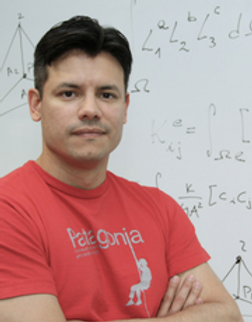Date: 05 June 2024
Time: 12.45 Hours
Room: RA1501 & online
Speaker: Dr. Juan Carlos Afonso (UT-ICT)
Title: "Simulation-based exploration of planetary interiors: from numerical models to probabilistic inversions"
Abstract: The coming decade will be a defining test for humanity and its capacity to respond to unprecedented global challenges. The current EU energy and planetary exploration plans create an enormous demand for alternative, greener and sustainable energy sources (e.g. geothermal) and more reliable ways to simulate subsurface processes and the internal structure of planets.
Traditional exploration approaches have struggled to provide a full characterization of the thermochemical structure of planetary interiors. In recent years, however, ‘simulation-based’ inverse methods that i) integrate multiple geophysical, geodynamic and geochemical datasets within an internally- and thermodynamically-consistent platform and ii) utilize state-of-the-art AI and numerical techniques to solve the inverse problem in a fully probabilistic manner, have opened new and promising ways to address this ‘grand challenge’. Reduced order modelling (ROM), data-missing reconstruction techniques and state-of-the-art thermomechanical formulations of natural processes are being combined to produce complete thermo-chemical-dynamical models of the subsurface at scales relevant to inform exploration strategies for clean energy and critical minerals.
In this seminar, I will review i) recent progress, case studies and future directions on simulation-based and data-driven approaches relevant to imaging planetary interiors, ii) their connection with fully dynamic inversion techniques powered by ROM and AI techniques, and iii) their impact and role in the energy transition.
About the speaker:
A/Prof. J.C. Afonso is a theoretical geophysicist and geodynamicist. His research focuses on the thermochemical structure and evolution of the lithosphere, the mechanical and geochemical interactions between tectonic plates and the sublithospheric upper mantle, and their effects on small- and large-scale tectonic processes. His most recent research combines multiscale probabilistic inversion and numerical modelling techniques to address some of the most fundamental questions about the nature and evolution of the lithosphere and upper mantle using a formal combination of multiple satellite- (e.g. gravity, magnetic field) and land-based (e.g. geochemistry, seismic) data sets. He also works on the development of numerical algorithms to model the complex couplings between geochemical and geodynamic processes inside planets at multiple scales.
